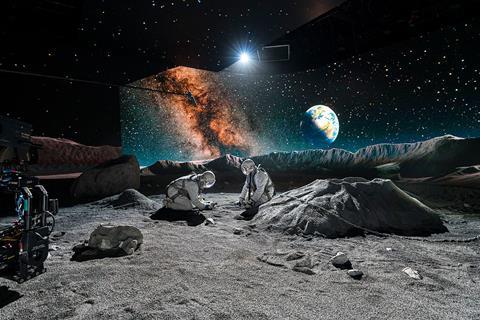
The world premiere of Pascal Schröder’s The Social Experiment on October 2 in Filmfest Hamburg’s ’Made in Hamburg’ strand is a first on several counts.
The sci-fi thriller is Schröder’s feature debut as well as producer Andreas Schlieter’s first foray into film production after heading up his Hamburg-based talent agency‚ Gipfelstürmer Schauspielagentur for the past 10 years.
In addition, it is the first German feature film to have been shot in a LED virtual production studio with technology used by such productions as Disney’s The Mandalorian and Netflix’s 1899.
Schlieter and Schröder first met when the latter was studying directing at the Hamburg Media School. “[Schröder’s] graduation film Monster Tale [from 2019] was absolutely stunning visually. I was totally fascinated by his approach as a filmmaker, which is more in the direction of mainstream cinema,” recalls Schlieter, selected for Screen International’s Future Leaders showcase in 2016.
At the beginning of 2020, they decided to work together on developing film projects and were offered the screenplay of psychological thriller Blinded Love by US author Reynaldo Pacheco. “It had a gripping plot about toxic relationships with an unexpected twist something like David Fincher’s Gone Girl,” Schlieter explains.
The pandemic put paid to the project however, so the duo were then drawn to the innovative potential for storytelling offered by virtual production technology.
Virtual potential
“Schröder and Raffaela Kraus [who also stars in The Social Experiment and is one of its co-producers] worked together on developing a story in an artificial world, making it possible to have a wide range of settings one could create using virtual production,” Schlieter says. “That meant we were able to shoot in a desert landscape, on the moon and with a sunset on a mountain top. And we even managed to create a heavy snowstorm blizzard in the studio with a combination of virtual production and SFX.”
Featuring a young cast of actors making their feature film debuts, The Social Experiment centres on five friends who are lured into an escape room-style adventure, a behavioural experiment developed to test the teenagers’ friendship to the limit and turning into a race against time and a battle between life and death.
In May 2021, Schröder and Schlieter established Gipfelstürmer Film with business partner Kai Steinmetz and veteran producer Guido Thomsen to handle the production of their first feature film. The financing came together through a combination of own funds, private investors, strategic partners and deferrals, with Hamburg’s local MOIN Filmförderung fund later providing support for the film’s postproduction.
Principal photography followed in January 2022 in a tight schedule of only 17 shooting days at Hamburg’s Cinegate/PRG virtual production studio, as well as on location in the city.
“We had more than 600 VFX shots in the film and decided to set up our own in-house VFX department so that we could complete the film as cost-efficiently as possible and within our set timeframe,” Schlieter recalls.
“It wasn’t a difficult decision for us to have the team continue working together as they were all so committed and, before long, we started getting inquiries about work for subsequent productions,” he adds, pointing out that Gipfelstürmer’s VFX artists have already delivered the effects for the ZDF crime series Mordsschwestern produced by ndF subsidiary Akzente Film, among others.
Soon after the film’s completion last spring Tobis came onboard as its German distributor - with a theatrical release scheduled for October 27 and struck a first-look deal with Schröder and Gipfelstürmer Film for future projects.
“We are developing various exciting story ideas with Tobis, including a series for a streaming service and a thriller for the cinema,” Schlieter said.

























No comments yet